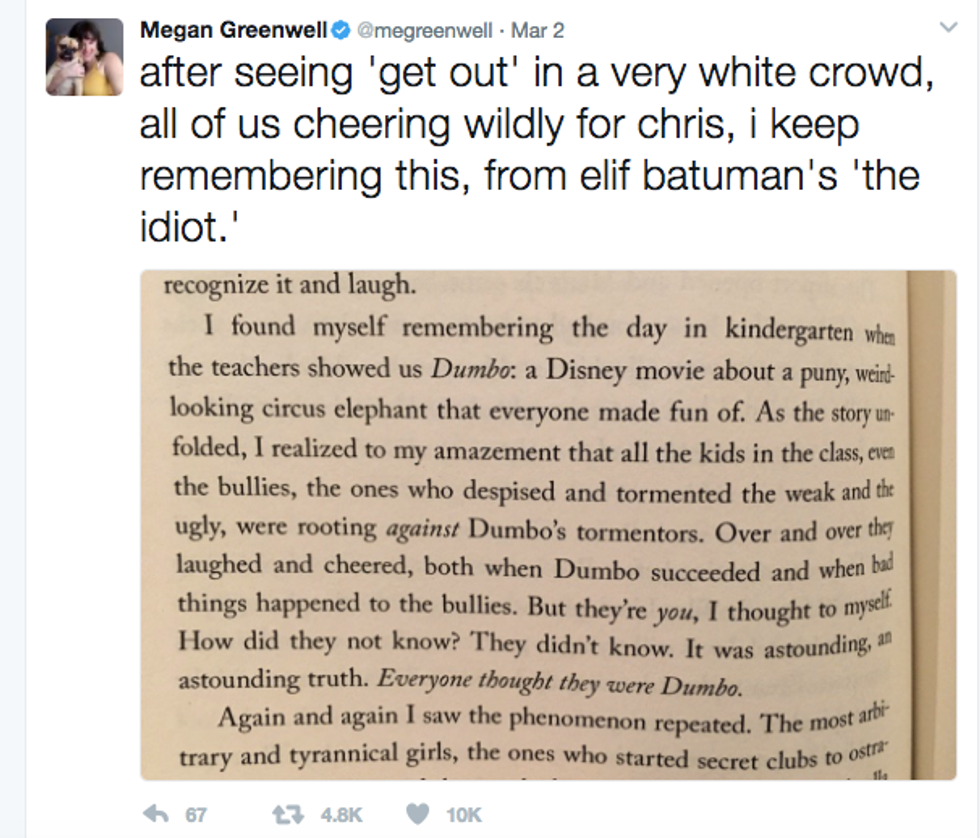Jordan Peele's horror film "Get Out" has had critics and everyday movie goers alike raving with positive reviews, and for good reason. The film captures the protagonist's perspective as a black man in contemporary American society, specifically within the context of his interracial relationship and his girlfriend's racist family, as it encapsulates the micro-aggressions, violence, and the general discomfort that black men face in white supremacist America.
From the psychological hypnosis scenes, creepy servants, violence, racism, and symbolism for white supremacy, the movie provides an extremely tense ambiance coupled with various hilariously comical commentaries by Chris's best friend Rod as he warns Chris from the beginning about Rose and her family. While I could go on forever about the symbolism and psychological aspects of the film, it is important to recognize my viewing experience of "Get Out" as a non-black movie goer, since I cannot personally attest to the very real fear that black people in this country face. After dissecting the film, it truly does a brilliant job of allowing non-black audience members to realize this as they feel compelled to try and understand this fear by being overzealous in rooting for Chris. Between the cheering, yelling, and loud comments, it seemed as if the audience I saw the film with was attempting to identify with Chris as much as they possibly could.
Throughout the film, various obviously uncomfortable attempts of white characters trying to empathize with black people are made. The audience cringed as sayings such as "I would've voted for Obama a third time if I could've!" and "I loooove Tiger Woods" were said to Chris by his girlfriend Rose's family and family-friends. These blatantly uncomfortable and shallow attempts by white characters trying to identify with Chris initially left people feeling like they were "in" on understanding the racial inequalities that the protagonist faced.
However, the film does a brilliant job of showing non-black movie goers that, in a way, we are also participating in a shallow attempt at identifying and empathizing with Chris as a black male protagonist. While we feel compelled to root for him and identify with him, we will never know what his experience is truly like, and we look just as shallow claiming to be "in" on it as the overtly racist characters in the movie try to be "in" with Chris. They say ridiculous things to him thinking it will make them fit in based on the assumptions that they have about black people.
Megan Greenwell succinctly describes this phenomenon in a tweet when she explained:
Here, Greenwell likens the "Get Out" experience to Elif Batuman's novel The Idiot in a scene in which school bullies watch the movie "Dumbo" and find themselves identifying and rooting for Dumbo even though they perpetuate the same harm to the bullied main character that Dumbo's tormentors perpetuate against Dumbo himself. This draws a parallel to the way in which non-black moviegoers like to think that they can identify with the oppressed protagonist, and they like to think they're different from the racists depicted in it, when really they are also guilty of maintaining harmful social norms and preconceptions that add to the oppression that the protagonist faces.
Jordan Peele has revealed that the movie had originally ended with Chris being arrested by the cops for killing Rose and her family members after they tried to kill him. According to Variety, Peele stated that he instead decided to go with a positive ending since “it was very clear that the ending needed to transform into something that gives us a hero, that gives us an escape, gives us a positive feeling when we leave this movie. There’s nothing more satisfying than seeing the audience go crazy when Rod shows up.” While Rose turns out to be in cahoots with her racist family the entire time and turns on Chris, Rod, Chris's black best friend, ends up being the one to save him and had warned him all along.
Ultimately, this ending speaks volumes for both the non-black audience's hypocrisy in attempting to identify with Chris while watching the film and thinking that they're worlds apart from the harm that the white characters in the movie elicit. "Get Out" prompts the question of whether or not we are just as bad as Rose and her family, and it makes us wonder if there is any hope of getting out of this dire situation that persists in the United States, and more broadly, in the world.





















